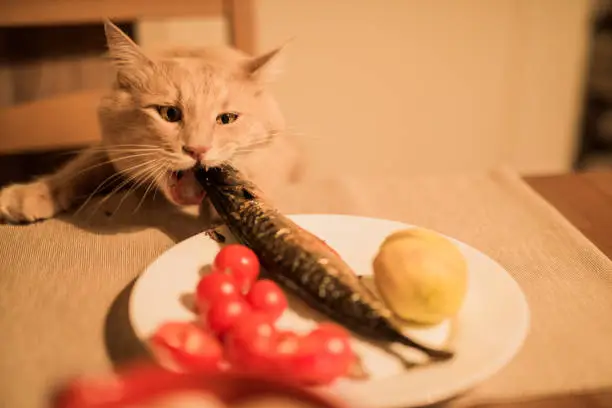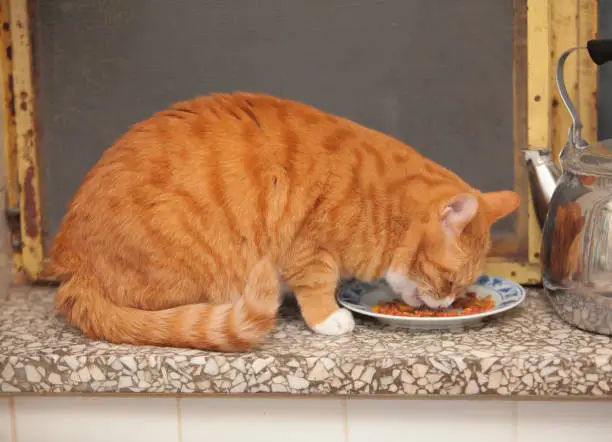Edamame – fresh green soybeans baked or boiled in the pod – make a popular appetizer for humans. But is this vegetable safe and healthy for cats? Edamame contains nutrients cats need, but also compounds toxic to felines in certain situations. Understanding proper preparation and portion sizes lets you share these tasty beans safely.
Can Cats Eat Edamame?
Can cats eat edamame appetizers? Whether cooked soybeans are safe and nutritious for cats? Learn proper preparation methods and portion sizes to avoid toxicity.
Are Beans and Legumes Safe for Cats?
Legumes like soybeans, green beans, lentils and peas offer valuable plant-based protein, vitamins, and fiber. But uncooked beans contain phytohemagglutinin, a toxin cats cannot digest. Cooking denatures this compound, making beans digestible and safe. This article is particularly helpful in answering our question can cats eat edamame?
However, cats lack key gut enzymes needed to fully break down legumes. So beans must be fed, cooked, puréed, and in strict moderation to avoid gastric upset. Signs of bean and legume intolerance in cats include:
- Vomiting or diarrhea
- Excessive gas
- Bloating or constipation
- Loss of appetite
Cats with kidney disease should avoid high phosphorus foods like beans. But for healthy cats, modest portions of cooked legumes can be fed as an occasional treat.

Are Green Soybeans Like Edamame Safe For Cats?
If you are a cat owner and thinking about eating edamame then first question that come to your mind is can cats eat edamame because of love with you kitto. Eating edamame can be safe and healthy for your cat.
Fresh soybeans, or eating edamame, can be safely fed to cats in moderation, provided:
- The edamame is cooked – raw soybeans are toxic. Blanch shelled edamame for 2-3 minutes until warmed through and easily crushed.
- The beans are puréed or mashed so cats don’t choke on whole beans. Cats lack grinding molars to crush them.
- Only the inner bean is fed – discard the fibrous outer pod. The pod is tough and may splinter.
- Just 1-2 edamame beans are fed at a time, once or twice a week at most. Don’t make it a daily treat.
- You monitor for signs of gastric upset or food intolerance. Discontinue if any issues arise.
When portion size and preparation guidelines are followed, most healthy cats enjoy eating edamame as an occasional snack without problems. As a pet owner, it is essential to know all about can cats eat edamame.
What Nutrients Do Green Soybeans Offer Cats?
In small amounts, eating edamame offers this nutritional value for cats:
- Plant-Based Protein – Cats are obligate carnivores, but digest limited plant protein well. Soybeans provide all essential amino acids.
- Vitamin K – Essential for proper blood clotting. Also benefits bone and kidney health.
- Thiamin – Vitamin B1 aids metabolism and growth. Prevents nerve damage from deficiency.
- Riboflavin – Vitamin B2 is important for cell function and energy production from food.
- Folate – Aids new cell generation and development. Prevent birth defects.
- Iron – Required for oxygen transport in blood. Prevents anemia.
- Magnesium – Supports enzyme function, bone health, and cardiac health.
The benefits of eating edamame include digestion and lowers cholesterol due to fiber in it, though cats have limited fiber needs. Overall, it offers a nutritious plant boost!
Can Cats Eat Other Parts of the Edamame Plant?
While the interior beans offer nutritional value for cats, other parts of the edamame plant should be avoided:
- Pods – The tough outer shell can splinter and poses a choking hazard. Discard pods.
- Leaves and Stems – Difficult to digest and may cause GI upset.
- Roots – Contain diosgenin compounds toxic to cats.
- Raw Seeds – Contain enzyme inhibitors interfering with digestion. Must be cooked.
Stick to feeding only the shelled inner bean, boiled until soft and mashable. This allows cats to safely enjoy the benefits of edamame.

Can Cats Eat Tofu?
Like edamame, tofu is made from soybeans but processed differently. Plain tofu is safe for cats in strict moderation if preparation guidelines are followed:
- Choose firm or extra firm tofu. Soft or silken tofu is too high in fat.
- Press the tofu first to remove excess moisture, then bake or pan-fry to make it easier to digest.
- Crumble the tofu into bite-sized pieces. Cut or tear into tiny cubes to prevent choking.
- Feed just a teaspoon or so once or twice a week at most. As with edamame, don’t overdo it.
Avoid flavored, spiced, fried, or marinated tofu, which often contain toxic ingredients. Overall, feed tofu sparingly as an occasional treat, not a dietary staple.
Can Cats Eat Soy Sauce?
Soy sauce should be avoided for cats as it contains high sodium levels their kidneys cannot handle. Just a teaspoon of soy sauce has over 1000 mg of sodium – far above the 40-50 mg cats need daily.
Signs of sodium toxicity in cats include:
- Vomiting, diarrhea
- Excessive thirst and urination
- Tremors, seizures
- Coma, death
Even in small amounts, soy sauce poses a poisoning risk for cats. Keep it off the list of “people foods” you share with kitty!
Can Cats Eat Eggs?
Eggs offer another source of healthy animal-based protein for cats prepared properly, eggs are perfectly safe in moderation:
- Scramble or hard boil eggs to destroy any salmonella risk. Avoid raw eggs.
- Remove shells before feeding to prevent choking or internal cuts.
- Feed just the egg white first to check for allergy. Yolks are very rich.
- Limit to just a teaspoon or so twice a week at most. A whole egg would be far too much!
The protein, vitamins and minerals in eggs make a nourishing occasional snack. But limit portions to prevent obesity or biotin deficiency from overfeeding.
Can Dogs Safely Eat Edamame?
Unlike cats, dogs can enjoy edamame more freely as an occasional treat or addition to their diet. Benefits for dogs include:
- Plant-based protein – Perfect for variety or sensitive digestive systems
- Fiber for bowel health – Also provides prebiotics for gut bacteria
- Chlorophyll aids detoxification
- Manganese and vitamin K support bone health

The pods pose little risk for larger dogs. Some dogs enjoy crunching the empty pods! But consult your vet before introducing edamame to identify any intolerances. Monitor for gas or loose stool. Then enjoy bonding over this healthy veggie snack.

